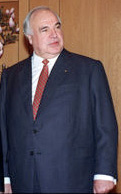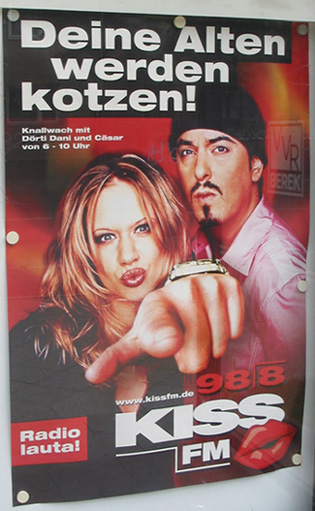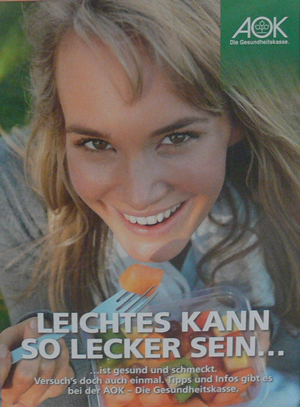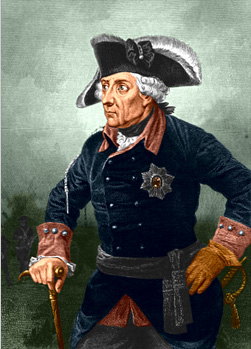|
|
 |
| (From Der Spiegel) A survey of 25,000 university graduates: why so many study the wrong thing. | |
Adjectival Nouns in English:

|
Because English adjectives are uninflected, it is more difficult to make nouns out of them. One can talk about certain abstract concepts like the True or the Good, but in most cases, at least one added word like "one," "thing," or something like "man," "woman," or "guy" is required to create a noun phrase: "He's an odd one." "Let's drink a cold one" [a beer]. "Have a good one" [a nice day]. "I did the wrong thing." "It is hard for a rich man to enter the kingdom of heaven." "I'm talking about the fat guy."
It can be a little easier in the plural: "The rich are different." "For ye have the poor always with you."
Adjectival Nouns in German:
Because German adjective endings carry considerable information about case, gender, and number, the noun that they modify can sometimes seem redundant. When Germans refer to Ex-Chancellor Helmut Kohl as der Dicke (the fat man), they don't need a further noun, since the der, followed by the -e ending on dick tells us that we are dealing with a single masculine subject (in the nominative case). So long as the context is clear, all that's needed to make the noun is to capitalize the first letter.
A number of such nouns constructed in this fashion have become conventional enough to be listed as dictionary entries in their own right. Some adjectives that become such nouns are "bekannt" [= acquainted], "angestellt" [= employed, hired], "verwandt" [= related], "erwachsen" [= grown-up], "heilig" [= holy], and "deutsch" [= German]:
|
|
 |
| der Dicke | |
| Sie ist eine gute Bekannte von mir. | She is a good acquaintance of mine. |
| Er ist ein Angestellter dieser Firma. | He is an employee of this company. |
| Meine Verwandten sind alle verrückt. | My relatives are all crazy. |
| Nur Erwachsene dürfen diesen Film sehen. | Only adults [grownups] are allowed to see this film. |
| Der Papst hat sie zur Heiligen erklärt. | The Pope declared her a saint. |
| Die Deutschen sind gern pünktlich. | Germans like to be punctual. |
(Note that "German" is the only nationality designated by an adjectival noun.)
Frequent usage has produced other conventions:
| Ich möchte ein Helles. | I'd like a light beer [a pils]. |
| Und ich nehme ein Dunkles. | And I'll have a dark beer. |
| Heute fahren wir ins Blaue. | Today we're driving into the wild, blue yonder. |
| Er traf ins Schwarze. | He hit the bull's-eye. |
| Mein Alter geht mir auf den Wecker. | My old man [my father] gets on my nerves. |
| Meine Alte versteht gar nichts. | My old lady [my mother] doesn't understand anything. |
|
|
 |
| Your parents will puke! | |
Plural adjectives of color represent members of particular political parties: e.g., "die Grünen" = the Greens; "die Roten" = SPD or PDS.
The examples above are all in the nominative case, but the adjectival inflections hold true in the accusative, dative, and genitive, as well. Here are examples of "the old man," "the rich woman," "the Good", "the poor [poor people]":
| Masculine | Feminine | Neuter | Plural |
| nom. | der Alte | die Reiche | das Gute | die Armen |
| * ein Alter | eine Reiche | * kein Gutes | keine Armen | |
| Alter | Reiche | Gutes | Arme |
| acc. | den Alten | die Reiche | das Gute | die Armen |
| einen Alten | eine Reiche | * ein Gutes | keine Armen | |
| Alten | Reiche | Gutes | Arme |
| dat. | dem Alten | der Reichen | dem Guten | den Armen |
| Altem | Reicher | Gutem | Armen |
| gen. | des Alten | der Reichen | des Guten | der Armen |
| Alten | Reicher | Guten | Armer |
Some of the forms in the above chart may seem hard to work into the conversation, but they do exist. Note the following:
| Es hat keinen Zweck, Altes mit Altem zu ersetzen. | There's no point in replacing old with old. |
|
|
 |
| Something light can be so delicious ... | |
They are more apt to show up in the vocative:
| Du Armer! | You poor fellow! |
In the plural, however, there are some surprises, especially in the vocative:
| Wir Grünen sind nicht so unrealistisch. | We Greens are not so unrealistic. |
| Ihr beiden seid echte Profis. | You both are real pros. |
Germans also frequently say or write "ihr beide", however. And, although "wir Grünen" and "ihr Grünen" are used more consistently, both "Sie Grünen" and "Sie Grüne" are possible. Go figure.
Note that "beide" is not capitalized. The same is true for "andere":
| Wir beiden sind da, aber wo bleiben die anderen? | We're both here, but where are the others? |
| Hast du etwas anderes zu sagen? | Do you have something else to say? |
| Ich komme mit den anderen. | I'll come with the others. |
| Diese Tasse ist schmutzig. Ich hole eine andere. | This cup is dirty. I'll fetch a different one. |
The adjective may also be in lowercase when the impression is less of an adjective used as a noun than of a noun having been omitted:
| Sie hat einen Weißwein bestellt, aber ich nehme einen roten. |
| She ordered a white wine, but I'll take a red. |
| Es gibt wenig gute Schriftsteller, aber er gehört zu den besten. |
| There are few good writers, but he belongs to the best. |
Compare this last example to the following:
|
|

|
| Only the best stay calm in difficult situations | |
|
|
 |
| Friedrich der Große | |
|
|
 |
| August der Starke | |
Certain forms appear in apposition:
| Friedrich der Große war König von Preußen. |
| Frederick the Great was the King of Prussia. |
| Kennst du August den Starken? |
| Do you know August the Strong? |
| Der Kaiser gab August dem Starken den Oberbefehl über die österreichischen Truppen. |
| The Emperor gave August the Strong command of the Austrian troops. |
| Sanssouci war das Sommerschloss Friedrichs des Großen. |
| Sanssouci was Frederick the Great's summer palace. |
A more common appositional structure is formed with the pronouns "etwas" or "nichts"
| Ich will dir etwas Schönes zeigen. | I want to show you something beautiful. |
| Er führt nichts Gutes im Schilde. | He's up to no good. |
| Wir reden von etwas Einmaligem. | We're talking about something unique. |
The adjectives "viel" and "wenig" sometimes look like pronouns, because they normally take no endings in the singular:
| Wir haben wenig Interessantes zu berichten. | We have little of interest to report. |
| Ihr Boss hat viel Gutes über Sie gesagt. | Your boss said a lot of good things about you. |
| Seine Rede enthält wenig Wahres. | His speech contains little that is true. |
Ordinal numbers act the same way as other adjectives:
|
|
|
| The best solution? Every second (person) has already found it. Berliner Sparkasse [Berlin Savings Bank]. Every second Berliner is already our customer. Demand more. | |
The possessive adjectives form nouns in the same way, except that they are not capitalized:
| Ich sehe dein Fahrad, aber wo ist meins? Naja, ich fahre mit ihrem. |
| I see your bike, but where is mine? Oh well, I'll take hers. |
| Er ist Deutscher, und ich bin auch einer. |
| He's a German, and I'm one, too. |
| Sie ist eine Verwandte von mir, also bin ich eine von ihren. |
| She's a relative of mine; thus I'm one of hers. |
| Es gibt mehrere reiche Länder in der Welt, und Deutschland ist eins von den reichsten. |
| There are several rich countries in the world, and Germany is one of the richest. |
Especially when using adjectives that have been derived from present or past participles, it is possible to pack a great deal of information into the adjectival noun:
| das Gefundene | that which has been found |
| die Gestorbene | the (female) deceased |
| die Gestorbenen | the (plural) deceased |
| ein Studierender | a (male) university student |
| die Studierende | the (female) university student |
| die Studierenden | the university students |
| ein Studierter | a (male) educated person |
| die Betende | the praying woman |
| der Alternde | the aging man |
| das Werdende | that which is in the process of becoming |
| der Auserwählte | the chosen (male) one |
| das Unverhoffte | the unexpected |
| die Leidtragende | the (female) mourner |
|
|
|
| Extravagance is the one true thing | |
*
The nominative masculine and neuter and the accusative neuter are different when the article is an "ein-word."
The articles in this category are ein, kein, and the possessive pronouns: mein, dein, sein, ihr, unser, euer, Ihr, ihr
The so-called "der-words" are the articles der, die, das, dies-, jed-, jen-, manch-, solch-, welch-.
